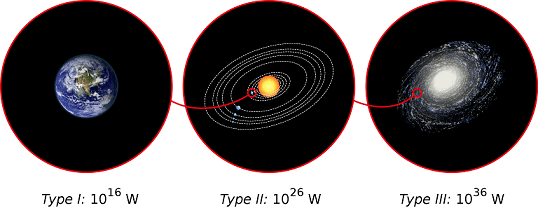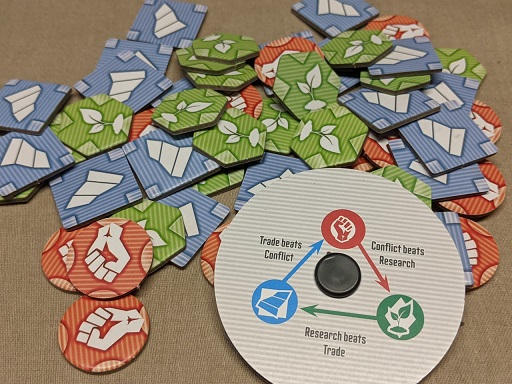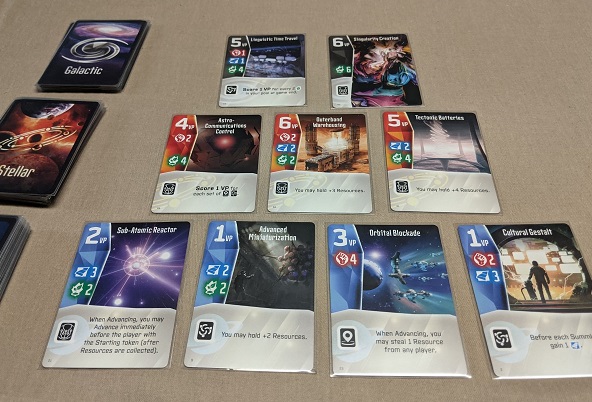The best quality of this Wizkids release is that it’s educational. Admit it, you’re unfamiliar with Soviet astronomer Nikolai Kardashev and his model of measuring a civilization’s technology level. His hypothetical scale is bracketed around how much energy a society is able to use, and it extends to a cosmic level.
Nifty. And there’s half the battle.

The rest of this is a little less exotic. In fact, I’d even call it mundane.
Kardashev Scale is a Stephen Avery and Eugene Bryant design that is best described as competent. It’s a very bare, straightforward experience that cuts directly to the point without any fluff, sharp edges, or compelling oddities.
Each round you set a dial. In secret, you will pick one of three resource types. The other players do the same. Then you all reveal.
Now, there is a little spark here. It’s the most interesting aspect of the game, actually. You gain a number of resources of the type showing on your dial, but only if you beat your neighbors sitting to the left and right. This is a very simple Rock/Paper/Scissors mechanism.
So, if you choose the red fist – it’s “conflict”, but no one calls it that – you receive two fist tokens for each neighbor that selected the green plant (“research”). If they selected the blue board game board instead (“trade”) then you get nothing. Blue is beaten by green which is beaten by red which is beaten by blue. Yeah, Board Game Board/Plant/Fist.
And that’s half of this 30-minute game. I don’t lie.

But I said that selection was the most intriguing aspect of the design. This is because there is a layer of interaction and double think that occasionally peeks a beady eyeball out of the cosmic slush. If you’re paying attention, you can somewhat accurately predict which resource a given player desires. And in doing so, you can then select a type which beats theirs and awards them with a big fat goose egg instead of those precious game boards. Maybe you even announce your prediction aloud and try to conspire with their opposite neighbor. Perhaps this is a ruse to throw your foe off their game and make ’em sweat a little. Occasionally you see these splendid moments and everyone is smiling.
This prediction is predicated on the other half of the game, the advancement cards. In the center of the table lies a tiered pyramid with each level mapping to one of the three categories of the Kardashev scale. The weakest cards reflect type I civilizations, those able to harness energy at a planetary scope. The second level are stellar civilizations, ones extending their wicked touch to the surrounding system. Finally, the most powerful and highest yielding map to type III, those societies of sufficient inventiveness to pull energy from their entire host galaxy.
It’s a clever nod to the game’s namesake and it works as a candid division of potency.

You buy these cards by selecting the fourth value on your dial, foregoing resource collection and instead spending your turn buying an advancement. This is the goal of the game. The resources are a means to this end.
Cards provide victory points as well as a special ability. And this is really where the game struggles. It fails to harness the energy of the table, unable to inspire the host galaxy and strike a deal with the empyrean beings its bargaining with. This is because the cards are dull.
Yet the structure is interesting. It’s a similar tableau builder to Race for the Galaxy, Glory to Rome, and Innovation. But it strips away the complexity and parcels out cards via a slick little bluffing game with very faint conflict. It’s a nice touch of “above the table” play, more conspicuously achieving what Race for the Galaxy provides in its action selection. But it stumbles as soon as it takes off.
Every successful game in this category allows players a thorough sense of achievement. This is often accomplished through the carefully constructed ability for participants to break the game. Wild stuff, like immediately triggering victory if you build the “Forum:. Or establishing such masterful economic dominance that you’re pulling in piles of victory chits each round.
Kardashev Scale is more incremental and measured in its offerings.
The most interesting combinations I’ve built allow you to gain extra tokens if you win on a certain symbol, and then trade them in at 2-for-1 to acquire other types, or maybe hoard them until game end for victory points. There are some other entertaining options such as stealing from other players or reducing costs, even a few cards which award bonus points for certain card combinations. However, it’s never world-shaking. At best you mutter “cool” and nod your head.
Even the costliest of cards – the type III options – typically just score you a wealth of points. I’m harnessing the energy of an entire solar system, I want to blow worlds apart like Thanos, not count some extra beans like a sly accountant.

There’s a restraint in this design, one which feels as though it’s attempting to patch a structural limitation.
The issue is that the game can feel too random with its resource collection. Allowing outcomes to snowball off such a degree of uncertainty would have offended a portion of players.
While there are moments when the Board/Plant/Fist system pays off, often you won’t even want to choose a specific selection to stymie your opponent. This is because hoarding resources is penalized, as you’re limited to only 10 total unless you acquire certain cards. Also, if you select the advancement option on your dial all of your neighbors automatically beat you and are awarded two of their chosen resource. This, combined with the short length of play, means you need to drive towards your objectives more often than trying sly maneuvers with slim odds of paying off.
This of course means sometimes you are inundated with green plant tokens, and other times you can’t get a red fist for nothing. If purchasing cards granted strong powers that were able to synergize and achieve even greater utility, those who suffered during the resource acquisition phase would have their souls ground into dust.
The restraint in card effects, then, feels as though it’s seeking to reward you with neat abilities while also wanting to be quite stingy in their overall potency. It’s like playing mind games with your boss, throwing out rock when the bastard chose scissors, finally winning that unattainable raise you’ve been working towards. Then you find out your pay increase amounts to a handful of Mcdonald’s Monopoly pieces from 2003. I’m not even talking something rare like “Park Place” or “Kentucky Avenue”, rather they’re making it rain “Marvin Gardens.”
This is not a terrible game. It’s just one best served as something to pull off the shelf when you want to kill time. Perfectly cromulent. Sadly, it compares unfavorably to astounding titles such as Jump Drive or Fantasy Realms, ones which provide satisfying engine and combo building with a similarly modest time commitment. I want a game like this to explode, to come unhinged when it hits the climax. Kardashev Scale is rather hinged.
A review copy was provided by the publisher.
If you enjoy what I’m doing and want to support my efforts, please consider dropping off a tip at my Ko-Fi or supporting my Patreon.

Thanks for the review. The Marvin Gardens line really made me chuckle.
LikeLiked by 1 person
Sorry for not enjoying your game more, Eugene. Hopefully it lands with other reviewers more strongly.
LikeLike
Where my Ding and Dent at, Dawg?
LikeLiked by 1 person
Hey Tim,
Unfortunately, I think Ding & Dent is likely done. Raf is just so busy with a third kid and playing games a little less frequently. He’s also way busier so finding time to edit is problematic.
I was personally also discouraged when our listener numbers fell by such a large number when coming back after the extended pandemic break.
We may record a goodbye episode at some point, but that’s not even guaranteed.
Sorry for the bad news.
LikeLike